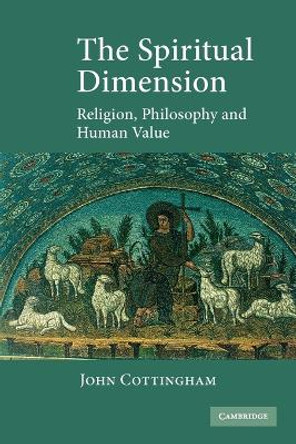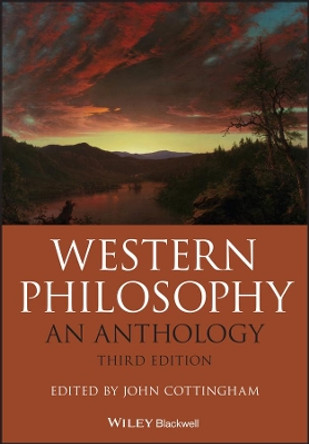Description
In this book, abstract intellectual argument meets ordinary human experience on matters such as the existence of God and the relation between religion and morality.
About the Author
John Cottingham is Professor Emeritus of Philosophy at the University of Reading; Professorial Research Fellow at Heythrop College, University of London; and an honorary fellow of St John's College, Oxford. He has served as chairman of the British Society for the History of Philosophy, president of the Mind Association, president of the Aristotelian Society and president of the British Society for the Philosophy of Religion. He was also editor of Ratio, the international journal of analytic philosophy, from 1993 to 2012. Professor Cottingham's books include Descartes (1986), The Rationalists (1988), Reason, Will and Sensation (1994), Western Philosophy: An Anthology, 2nd edition (2007), Philosophy and the Good Life: Reason and the Passions in Greek, Cartesian and Psychoanalytic Ethics (Cambridge, 1998), On the Meaning of Life (2003), The Spiritual Dimension (Cambridge, 2005), Cartesian Reflections (2008) and Why Believe? (2009). He is co-translator of the standard three-volume Cambridge edition of The Philosophical Writings of Descartes (1985-91). The Moral Life, a collection of essays honoring his work on moral philosophy and philosophy of religion, was published in 2008.
Reviews
'This insightful and beautifully clear book shows us how to think philosophically about religion - not just religious beliefs but also the habits, practices and transformations that constitute religious life. Cottingham combines careful, rigorous analysis and exemplary scholarship with rare sensitivity to the spiritual questions which animate the philosophy of religion but are too often obscured by it. Everyone interested in the philosophy of religion needs to read this elegant, compelling book.' Clare Carlisle, King's College London
'... intellectually brilliant, historically well informed, and engaged with contemporary thought. Cottingham is keenly aware of how the practice of philosophy should inform our search for meaning in our lives; this text is perfect for a class or for individual enrichment.' Charles Taliaferro, St Olaf College, Minnesota
'A lovely work: passionately engaged and intellectually serious ... it shows how philosophy of religion really can be more humane, engaging with our deepest faculties of need and desire, while remaining thoroughly rigorous ...' Christopher Hamilton, King's College London
'Rigorous, elegant, and yet passionate, it is hard to think of a better introduction to this area ... Cottingham's nuanced and capacious survey of the philosophy of religion sheds fresh light on familiar topics and points to fertile new directions.' Douglas Hedley, Clare College, Cambridge
'A wide-ranging and compelling philosophical argument for recognizing a spiritually focused and morally oriented approach to the philosophy of religion.' Keith Ward, Regius Professor Emeritus of Divinity, University of Oxford
'In this lively and accessible study, John Cottingham shows how religious beliefs are best regarded not as abstract speculations but as reflections integrally connected to the question of what it is for a human being to live well. If religion, so conceived, is to be properly understood, then we require a kind of reflection that is philosophically rigorous and, at the same time, rich in an appreciation of the disciplines of thought that we associate with the humanities. Here is a fine and, indeed, inspiring example of such an inquiry.' Mark Wynn, University of Leeds
'Cottingham provides a refreshing perspective on the relationship between the philosophy of religion, as a field of academic study, and the religious life, as a field of personal experience. Trained as a philosopher, Cottingham is well aware of the contributions analytic and metaphysical methods can bring to the task of clarifying and understanding ideas. But he also knows, as many analytic philosophers apparently do not, that religious life needs more than the clarity of philosophical analysis. He calls his approach to the philosophy of religion 'more humane' than the ideas that presently prevail in his discipline. He makes a persuasive case against those who think that either defending or refuting 'proofs' for the existence of God constitutes the core of the religious life. In fact, what Cottingham develops with scholarly cogency are the various 'modes of access' one has to the divine, especially the heart dimension in religious life and thought (drawing heavily on Pascal). In the course of this short book, he also takes up the issues of morality and theodicy in ways that are faithful to their nuances and complexities.' Choice
'... clear, thoughtful and gently passionate style. ... a wonderful book; creative, harmonious, evocative, reasonable. I cannot recommend it enough ...' Maximilian De Gaynesford, Tablet
Book Information
ISBN 9781107695184
Author John Cottingham
Format Paperback
Page Count 208
Imprint Cambridge University Press
Publisher Cambridge University Press
Weight(grams) 290g
Dimensions(mm) 226mm * 147mm * 23mm







